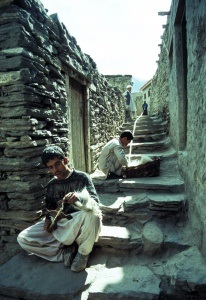Abdul Malik is CEO of the Aga Khan Rural Support Programme (AKRSP) in Pakistan. He spoke with the Communications staff of the Aga Khan Foundation U.S.A. during a recent visit to Washington, DC.
Q: How does AKRSP address rural-urban migration and poverty?
Abdul Malik: We address this on several levels. First, AKRSP is working on a new program to improve the odds of success for people who migrate between rural and urban areas. With funding from the Canadian Department of Foreign Affairs, Trade and Development (previously called CIDA), we work on youth employability. The project focuses on imparting skills that help young men and women become more employable in local markets. Some of those skills are transferable across sectors – for example, how to present oneself in an interview and how to prepare a CV. I am confident that this initiative will support people who migrate within Pakistan, as well as outside the country.
A second part involves enterprise training for youth. With support from donors like the U.S. Agency for International Development (USAID), AKRSP imparts business and management skills to young entrepreneurs, both men and women. Some of those entrepreneurs are getting capital via loans from banks, but also from remittances they receive from relatives elsewhere. These efforts help those who choose to stay in their villages, but also those who have moved or are moving to urban centers to find employment.
Q: Previously you’ve noted AKRSP’s engagement with the private sector. Are there connections that you would like to highlight now?
AM: We are working in several key economic sectors: 1) renewable energy – micro and mini-hydro power; 2) minerals — gemstones and jewelry, and 3) high-value agriculture. A significant effort is focused on supporting local entrepreneurs in the selected sectors. Within high-value agriculture, we have a grant from USAID to improve irrigation infrastructure and agriculture in the northern Skardu district. As we approach our activities through a private-sector-oriented lens, the trainings that we give to farmers are provided by a private-sector company called Star Farm, which is linked to a large local retail chain in Pakistan. In addition to providing market-oriented trainings, they are helping farmers to place their products in national outlets. We believe such partnerships with the private sector can make our activities more sustainable and business-oriented.
Q: AKRSP is involved in other AKDN programs, such as the Chitral Child Survival Program, a USAID grant to support community midwives in Chitral province. How does that work?
AM: AKRSP’s relationship with the Chitral Child Survival Program focuses on community-based savings groups. AKRSP has been responsible for fostering community-based savings groups and helping them graduate to the next level. This model has been crucial in expanding access to financing for the rural poor, particularly women, in meeting household financial needs surrounding health, education and household consumption. We are planning to replicate this model in other underserved areas.

Young men spinning wool to make carpets as a part of AKRSP’s focus on supporting young entrepreneurs.
Q: Please talk a bit about the AKRSP youth program.
AM: We are currently implementing a very exciting youth program that works with young men and women to advance their innovative ideas and build their capacity to address social issues and gain productive employment.
One popular activity has been the micro-challenge award. These awards are designed to encourage young people to pursue viable ideas that address pressing issues experienced by their peers and their communities. We got an overwhelming response when we announced the small grant awards through local media and institutions. From more than 270 proposals, we selected 45 through a thorough evaluation process. Most finalists focus on education, media, and expanding opportunities for youth and women. In many cases, award recipients have leveraged the micro-grant ($300-1000) to access other funds.
We also receive business ideas from youth. We are considering supporting around 10 young entrepreneurs in sectors from horticulture and handicrafts to health and education services. We aim to increase the number of these grants in coming years.
Young men and women in Pakistan have lots of interesting ideas about how to make business viable, how to increase employment, how to address a social concern, and how to address environmental issues in their communities. I believe that initiatives like micro-grants that encourage them to pitch their ideas and provide support through competitive and transparent mechanisms can help unleash their true potential.